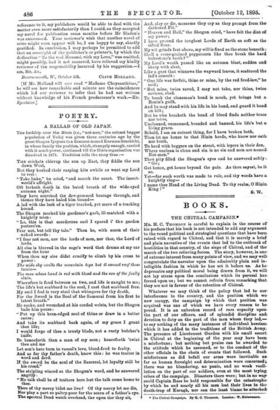POETRY.
A BALLAD OF OLD JAPAN.
THE lordship over the Hinin (i.e., "not-men," the outcast beggar population of Yedo) was given three centuries ago by the great Shogun Iyeyasu to a Samurai named Kuruma Zenshichi, in whose family the position, which, strangely enough, carried with it much power, continued till the Llinin organisation was dissolved in 1571. Tradition tells the story thus :- THE crickets chirrup the sun up East, they fiddle the sun down West,
But they hushed their rasping kits awhile as went my Lord to rest : "Take links," he cried, "and search the court. The insect- world's affright.
Oft lurketh death in the bated breath of the wide-eyed autumn night."
They have searched the dew-gemmed boscage through, and thence they have haled him bound—
A lad with the look of a tiger tracked, yet more of a tracking hound.
The Shogun marked his gardener's garb, ill-matched with a knightly mien : " Lo, this is that murderous earl I spared i' the garden yestere'en.
Fear not, but tell thy tale." Then he, with scorn of their naked swords : "I fear not men, nor the lords of men, nor thee, the Lord of lords.
All else is blurred in the sage's word that drums at my ear from the hour When thou my sire didat crucify to climb by his cross to power :
The wide sky vaults the mountain tops but it cannot roof these twain—
The man whose hand is red with blood and the son of the foully slain.
Wherefore is feud between us two, and life is naught to me; The life's but scabbard to the soul, I cast that scabbard free. My soul I feel is very steel that whimpers for thy death, For the Sword is the Soul of the Samurai from his first to latest breath."
He spoke, and wrenched at his corded wrists, but the Shogun bade him pause: " Put up this keen-edged soul of thine or draw in a better cause; And take its scabbard back again, of my grace I grant thee life; I would forge of thee a trusty blade, not a rusty butcher's knife.
Be henceforth then a man of my men ; henceforth 'twist thee and me Let son's hate turn to vassal's love, blood-feud to fealty. And as for thy father's death, know this : he was traitor in word and deed.
If the sword be the soul of the Samurai, let loyalty still be his creed."
The stripling winced at the Shogun's word, and he answered angrily : "No talk shall be of traitors here lest the talk come home to thee.
Thou of thy mercy bidst me live? Of thy mercy let me die, Nor play a part so paltry-poor for the scorn of a father's eye. The spectral Dead watch overhead, tier upon tier they sit, And, slay or die, meseems they cry as they prompt from the darkened Pit."
" Heaven and Hell," the Shogun cried, "have felt the dint of my power; I have ground the toughest Lords of Earth as soft as the sifted flour.
My wit grinds fast above, my will is fixed as the stone beneath: Shall a cross-grained peppercorn like thee break the hard buhrstone's teeth P "
My Lord's wrath passed like an autumn blast, sudden and sharp with sleet,
Like a gust that winnows the wayward leaves, it scattered the lad's conceit : " One life was forfeit, thine or mine, by the red feud-law," he said ; " Bat mine, twice saved, I may not take, nor thine, twice- saviour, shed.
To break the clansman's bond is much, yet brings but a Ronin's guilt, And he may stand with his life in his hand, and guard it hand on hilt; But be who breaketh the bond of blood finds neither truce nor trove, Unclanned, unmanned, branded and banned, his life's but a living grave.
Behold, I am an outcast thing, for I have broken both,
Then let me hence to that Hinin horde, who know nor oath, nor troth,
To herd with beggars on the street, with lepers in their den, Where unclean is clean and sin is no sin and men are named Not-men."
Then pity filled the Shogun's eyes and he answered softly : " Go ; Get hence, get hence beyond the pale. As thou sayest, be it so.
Yet—for such worth was made to rule, and thy words have knightly ring— S. W.


















































 Previous page
Previous page